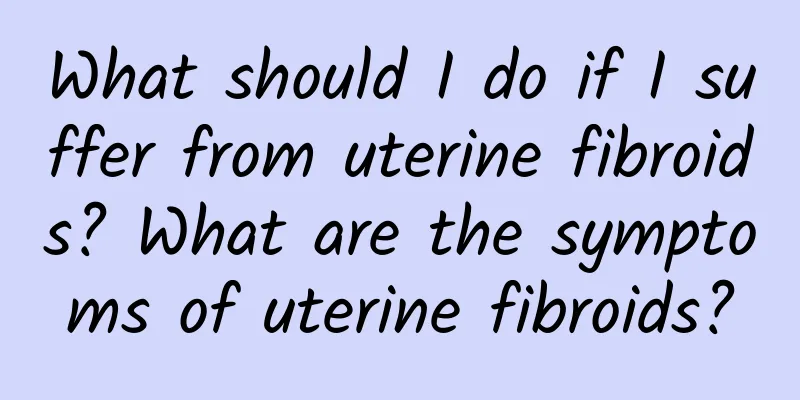What should I do if I suffer from uterine fibroids? What are the symptoms of uterine fibroids?

|
With the development of society and the improvement of health awareness, more and more female friends have begun to pay attention to the relevant content of gynecological diseases. Especially for diseases with high incidence such as uterine fibroids, understanding their related symptoms plays a very important role in preventing uterine fibroids. Gynecological experts will introduce the symptoms of uterine fibroids. Low back pain and abdominal pain: Common symptoms include lower abdominal swelling, back pain, etc. In some special cases, acute pain may occur, such as torsion of pedunculated myoma, or red degeneration during pregnancy, which may be accompanied by fever. Increased vaginal discharge: Intramural fibroids increase the area of the uterine cavity, increase endometrial gland secretion, and are accompanied by pelvic congestion, leading to increased vaginal discharge. If it is a submucosal fibroid, its surface is prone to infection and necrosis, producing a large amount of pus and blood secretions, accompanied by odor. Menstrual changes: When fibroids enlarge the uterine cavity, increase the area of the endometrium, cause poor uterine contraction or excessive endometrial hyperplasia, or submucosal fibroids, menstruation may be prolonged and menorrhagia may occur. Failure to treat the condition in time may lead to anemia. Abnormal urination and defecation: If the fibroids are large or grow in the cervix, broad ligament, etc., clinical symptoms of squeezing adjacent pelvic organs may occur, such as constipation, frequent urination, residual urine, ureteral displacement, hydronephrosis, etc. Abdominal masses: When a lump is large or growing rapidly, it can usually be felt in the middle of the abdomen and is firm in texture, especially in the morning when the bladder is full. Infertility: About 25%-40% of women suffer from infertility due to compression or twisting of the fallopian tubes by fibroids, which affects their normal function, or deformation of the uterine cavity caused by fibroids, which hinders the implantation of the fertilized egg. |
>>: What are the symptoms of uterine fibroids? How to identify uterine fibroids
Recommend
Obesity not only shortens one's lifespan, but also makes one old and bedridden. Reducing these three values can help the elderly live longer and safer.
Cardiovascular disease Among the top ten causes o...
How to take care of uterine fibroids after surgery? How to take care of uterine fibroids after surgery
Paying attention to the postoperative recovery of...
The secret to not gaining weight again! Learn to eat easily with "My Plate"
The most feared thing about losing weight is gain...
Excessive menstrual flow is a typical symptom of cervical hypertrophy
Cervical hypertrophy is a common gynecological di...
Do shoulder blade stretching exercises to relieve back and shoulder pain
Shoulder pain, back pain Once the hip joint or pe...
Sequelae of Bartholinitis
Bartholinitis may lead to sequelae such as repeat...
What should I check when my period is delayed?
When women have delayed menstruation, it is very ...
Treatments for irregular menstruation
Treatments for irregular menstruation: Irregular ...
What causes uterine fibroids? What should I do if I have uterine fibroids?
As we all know, uterine fibroids are common benig...
What are uterine fibroids? Can uterine fibroids cause infertility?
Uterine fibroids are the most common gynecologica...
Lack of menstruation after miscarriage
Less menstrual flow after miscarriage is usually ...
Cervical erosion is a common type of cervicitis
There are many types of cervicitis, such as cervi...
Is microtubule painless abortion good?
Is micro-tube painless abortion good? 1. Compared...
A magic tool for losing weight and eliminating edema! The taste of Aiyu lemon can also whiten your skin...
The weather is chilly and the skin is prone to dr...
What is the best time for couples to have sex? These golden times have their own advantages
I often hear this question in the clinic: "D...









